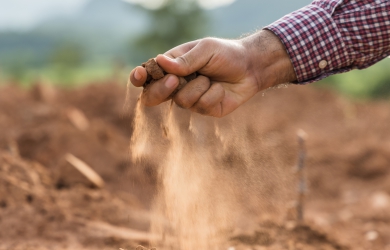How IoT in Agriculture Helps Monitor and Maintain Soil Health

Agritech in the farming industry is set to become more important than ever in the next few decades. Farmers and agricultural companies are thus turning to the Internet of Things (IoT) to meet the ever-growing demand. Currently, about half of the total habitable land across the globe is used for agriculture; more than three-quarters of which is taken by livestock. The rest, used for raising crops, is responsible to meet the rising food requirements of the incessantly growing global population.
However, the devastating impacts of climate change, rapid industrialization and urbanization, excessive farming, erosion, and pollution have threatened the ability of arable land and its soil to bear healthy crops. Therefore, to conserve the fertility of the soil and overturn the current situation, agricultural companies are leveraging IoT-based agriculture solutions to monitor and maintain soil health.
Challenges Faced in Maintaining Soil Quality
The fertility, temperature, moisture content of soil and weather conditions play an important role in determining crop health. However, the majority of farmers, especially those who own small pieces of land, are deprived of the right equipment to monitor their land for maintaining soil quality. Moreover, manual checks for soil parameters add a significant burden on the total operational cost. These farmers also need to put a high level of effort to check the soil humidity status of the entire farm manually.
When there is insufficient data, farmers find it difficult to determine whether the soil in their fields has desirable pH levels, whether there is enough water at any given time and if temperature conditions are suitable for the crop being grown. The inability to monitor these characteristics in their land makes it hard for farmers to maintain these parameters at preferred levels.
The lack of real-time soil information can lead to inefficient use of resources, over-irrigation, over-spraying of fertilizers or pesticides, and consequently, degradation of soil. In the long run, this can affect the financial prospects of the farmer as well as the health of those who consume food from these farms.
Applications of IoT in Soil Monitoring and Management
As IoT becomes a central component of precision agriculture, many farmers have recently been leveraging IoT-based agriculture sensors and solutions, especially in soil monitoring, to maximize yield, reduce disease, and optimize resources. The most common applications areas of IoT in monitoring and maintaining soil health include:
Soil Temperature
Soil temperature influences root growth, respiration, decomposition, and nutrient mineralisation in the soil. The most accurate measurement of temperature helps farmers determine the right time to plant and cultivate crops to ensure higher productivity. Temperature sensors or IoT sensors that use infrared (IR) technology can be strategically placed beneath the ground to provide farmers with real-time updates on soil temperature.
Soil Moisture
Water is not only essential for photosynthesis but also an important nutrient for all plants. As soil moisture helps regulate temperature and influences crop productivity, farmers can use buried probes with electrodes to effectively monitor soil moisture content and IoT sensors to gather data on soil humidity and automate irrigation.
Solar Radiation
Solar radiation refers to the amount of heat that reaches the earth from the sun, which is key to photosynthesis. IoT in agriculture helps measure various types of solar radiation that causes fluctuations in soil temperature and affects soil moisture evaporation. For enhanced crop productivity, agricultural companies can also use IoT sensors to measure shortwaves, ultraviolet (UV) rays, and photosynthetically active radiation (PAR) and understand their correlation with soil temperature and moisture.
Weather
Various environmental factors such as air pressure, temperature, humidity, wind direction and speed, and rainfall affect productivity. Agricultural companies need to collect data pertaining to these parameters to make adequate operational modifications and improve farm productivity. IoT-based agriculture solutions empower agribusinesses and farmers through the periodic, automatic, and remote collection of real-time data that makes agriculture practices more precise and scientific. IoT-based connected devices can also be configured to notify farmers whenever any readings deviate from expected values.
NPK Measurements
Farm managers need to effectively measure the soil nutrient content i.e., nitrogen, phosphorus, and potassium. With IoT sensors and connected devices, farmers can detect nutritional deficiency of soil, and accordingly, determine the need to apply the right type of fertilizers to improve crop productivity without affecting soil fertility.
What are the Advantages of Soil Management with IoT?
By embedding IoT sensors in agricultural soil, farmers can monitor various parameters around the clock in real-time. The use of agritech-based devices such as IoT sensors can not only enable remote soil monitoring but also makes it cost-effective in the long run. With the right amount of data on soil moisture, IoT in agriculture ensures smart water management and mitigates the depletion of groundwater reservoirs. Moreover, these technologies provide information in real-time that eliminates the concerns of overwatering or underwatering. As a result, farm managers are able to prevent the issues of poor plant health and shunned crop growth.
IoT-based agriculture solutions are undoubtedly more efficient than manual maintenance checks and testing as they provide accurate, up-to-date, and automated data. This information helps agribusinesses and farm managers to gain a comprehensive understanding of soil health and take necessary action accordingly. Furthermore, IoT in agriculture aids in choosing the ideal crop for prevailing temperature, moisture, weather, and nutrient conditions to ensure productivity and profitability while saving both time and resources.
Owing to the aforementioned advantages, the use of IoT-based agriculture solutions to monitor and maintain soil health can bring immeasurable benefits to agribusinesses. However, as most farm owners are neither tech-savvy nor knowledgeable about soil chemistry, an expert for clear decision support at different levels is necessary.
Agritech experts can smartly use new-age technologies to help agribusinesses achieve optimum soil health and enhance overall productivity. FarmERP is one such company of agritech experts that can help agribusinesses and enterprises in improving the soil health of their fields. Contact us to know how FarmERP can aid your farm management efforts and assist you in yielding crops of the highest quality standards.
